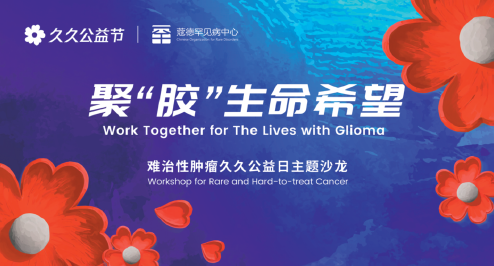Giving Day puts rare and hard-to-treat diseases in the spotlight

The 99 Giving Day public welfare festival, one of the largest public charity festivals in the world, has once again heightened awareness about rare and hard-to-treat diseases among the public. In an effort to shed light on gliomas, a prevalent type of primary brain tumor in adults, leaders from pharmaceutical companies, medical experts, and patients united to advocate for increased support for affected families and improved accessibility to medications.
Zhang Tao, a man diagnosed with a glioma in 2015, shared his journey at a glioma-themed gathering on Sept 3. His ordeal began with sporadic tremors in one side of his body while asleep toward the end of 2014.By 2015, due to excessive work and nightly vigils, he developed epilepsy. Medical examinations uncovered a tumor in his frontal temporal lobe, leading to surgery.
Unfortunately, the disease recurred in 2022, prompting another surgical intervention. However, the treatment took a toll on his wellbeing. Following 15 rounds of radiation therapy, he began experiencing severe hair loss. Moreover, post-surgery, his memory suffered partial impairment.
"My memory would falter, at times leaving me blank. To cope, I prioritize daily tasks and rely on WeChat reminders. I urge everyone to show empathy toward patients," Zhang said.
Li Xiaoli and her family have been suffering from a similar condition. Her husband was diagnosed with the disease in 2021. She was stunned upon seeing the tumors on her husband's scans. "I was unaware of such a condition's existence and found it incredibly difficult to accept," Li recounted. "As treatment progressed, the side effects of the radiation and chemotherapy become apparent. By the end of 2023, my husband began to show cognitive impairments, and then he became a stranger to me."
Zhang emphasized that gliomas are a rare disease with a limited patient pool and treatment options. Typically, surgery coupled with radiation and chemotherapy constitutes the primary treatment method. Unfortunately, most patients experience relapses, with fewer treatment avenues available at that stage. Owing to low awareness, many patients are left bewildered at the initial diagnosis, some gripped by fear.
The complexity of treating gliomas has spurred the emergence of unverified treatments, delaying proper care for patients. Despite their own challenges they faced, Zhang and Li founded the Glioma Hope Family, a community uniting more than 6,000 people to exchange knowledge, helping many avoid unnecessary treatment detours. Overseas patients have also shared valuable insights on seeking medical care abroad.
While some patients manage to resume work post-treatment, those with lesions in functional areas struggle to reclaim normalcy. Memory loss, cognitive impairments, epilepsy, coordination deficits, paralysis, and more afflict many. Gliomas are elusive, often discovered due to symptoms like headaches and epilepsy.
Ren Xiaohui, chief physician of neurosurgery at Beijing Tiantan Hospital, said at the event: "Although the pathogenesis of glioma is not yet clear, it has been confirmed that IDH (isocitrate dehydrogenase) mutations are an important pathogenic gene of glioma and play a crucial role in its occurrence and development. Looking forward to the future, glioma is entering the stage of precision medicine. By combining multidisciplinary technologies such as genomics and molecular biology, we can achieve accurate diagnosis and targeted treatment of glioma as soon as possible. As a doctor, we look forward to actively cooperating with all sectors of society to provide more medical support and humanistic care for patients who are urgently waiting, to improve their treatment benefits and quality of life."
Kevin Huang Rufang, founder and president of the Chinese Organization for Rare Disorders, highlighted at the gathering that the primary challenge in treating rare diseases lies in the availability of medication. Globally, the pace of developing pharmaceutical drugs for rare diseases, including rare tumors, remains inadequate, with several conditions lacking treatment options. Furthermore, many pharmaceutical drugs are inaccessible in China, posing a significant hurdle.
Servier, a medical company headquartered in Suresnes, France, operating under a nonprofit foundation, has focused on rare cancers and hard-to-treat cancers, with a view to becoming a focused and innovative player in cancer treatments. Manuel Ruiz, Servier China's general manager, stressed the pivotal role of pharmaceutical companies in therapeutic advancements, despite the inherent risks and uncertainties involved. Efforts are underway to accelerate Chinese patients' access to innovative medications through collaborations with pilot regions and local regulatory bodies.
"We are also striving to find ways to accelerate Chinese patients' access to innovative therapies for IDHmt diffuse glioma. We are currently working on collaborations with some pilot regions that have policies for priority access to innovative drugs in urgent needs, as well as local regulatory agencies," Ruiz said.
"At Servier, we put the patient at the core of our decision-making, from the earliest phase to the latest ones to be sure we serve patients' needs. And we will continue more collaborations with patient associations in China, such as CORD and the Glioma Hope Family, as well as with Chinese doctors. Together we are stronger," Ruiz added.
The Chinese government has also prioritized enhancing access to innovative medications. A recent guideline released by the State Council aims to accelerate the approval of innovative pharmaceutical drugs, medical devices, rare disease therapeutics, and equipment essential for infectious disease control. Notably, Tianzhu Comprehensive Bonded Zone in Beijing's Shunyi district focuses on pharmaceutical drugs for rare diseases, urgent medical devices, gene therapy and cell therapy products. The zone plans to import a range of rare disease pharmaceutical drugs and clinically urgent medications in 2024.
The Hainan Boao Lecheng International Medical Tourism Pilot Zone, initiated in 2013, boasts specific policies enabling the use of pharmaceutical drugs and medical devices approved by the United States Food and Drug Administration or bearing the CE (European Conformity) mark. Boao Lecheng has introduced more than 300 pharmaceutical drugs and medical devices in the zone to date, showcasing its commitment to advancing healthcare.

Today's Top News
- Xi chairs CPC leadership meeting on Party conduct, anti-corruption work
- Why Hainan Free Trade Port stands out
- Rule of law strengthens business environment
- Documents affirm one-China principle
- Central SOEs urged to push upgrading
- Agreement boosts ocean governance






























